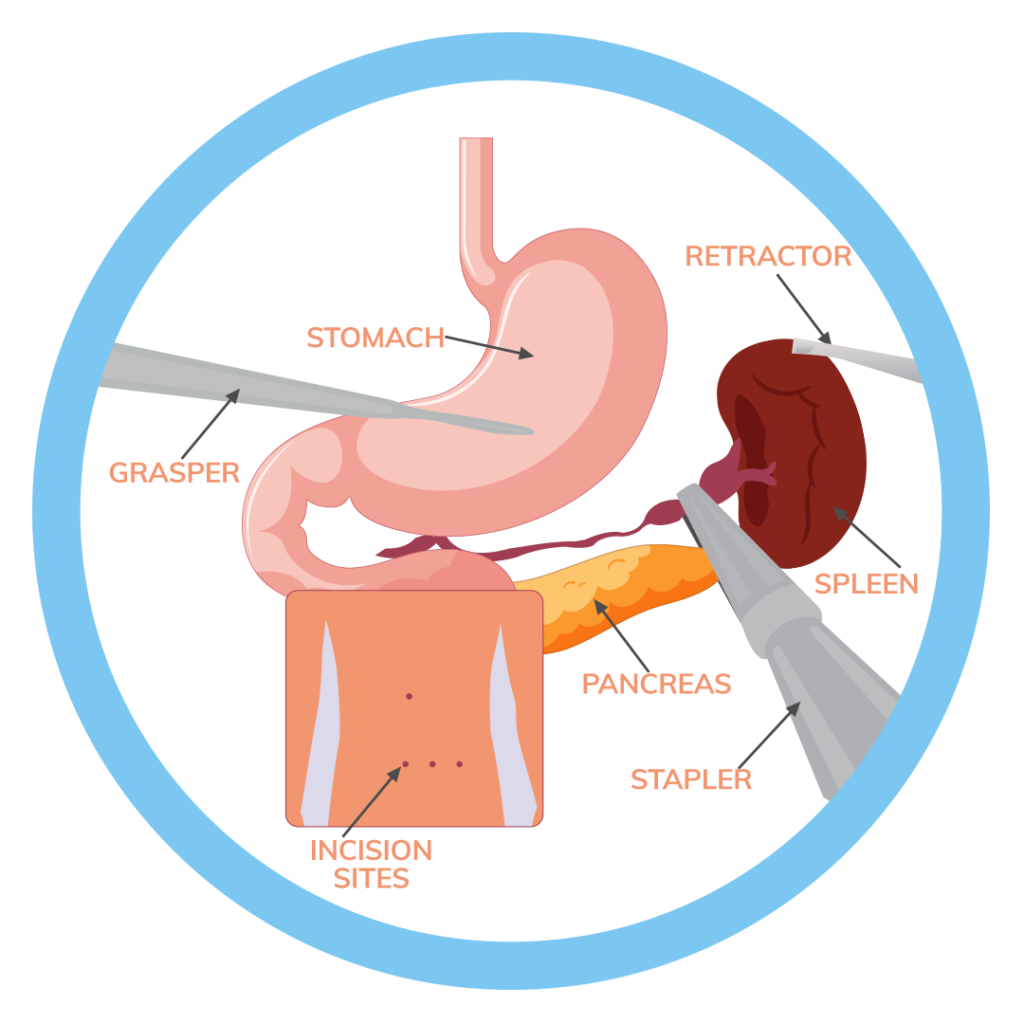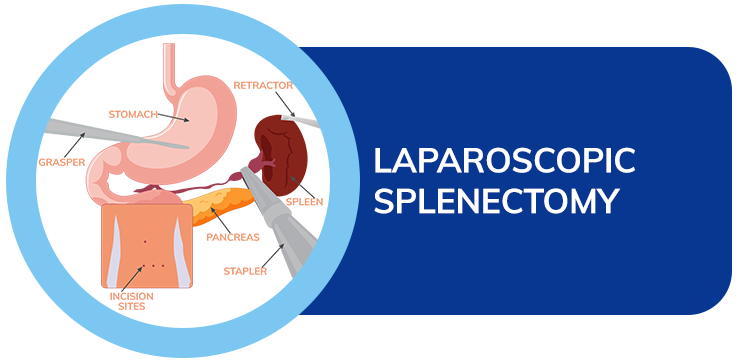
In a laparoscopic splenectomy, your surgeon makes few small incisions in your abdomen. Then, they use a small camera to project a video of your spleen onto a monitor. Your surgeon can then remove your spleen with small tools. A splenectomy is a procedure to remove the entire spleen, a delicate, fist-sized organ that sits under the left rib cage near the stomach. The spleen is an important part of the body’s defense (immune) system. It contains special white blood cells that destroy bacteria and help the body fight infections when you are sick. It also helps remove, or filter, old red blood cells from the body’s circulation. You may need to have your spleen removed if you have an injury that damages the organ, causing its covering to break open, or rupture. A ruptured spleen can lead to life-threatening internal bleeding.
Splenectomy is recommended in cases of splenic cysts and tumors like lymphoma. It might also be recommended for blood-related disorders such as hereditary spherocytosis, idiopathic thrombocytopenia, hypersplenism, etc.
Since this type of surgery is minimally invasive and done laparoscopically performed hence it has a quicker and less painful recovery time than open surgery.

In a laparoscopic splenectomy, your surgeon makes few small incisions in your abdomen. Then, they use a small camera to project a video of your spleen onto a monitor. Your surgeon can then remove your spleen with small tools. A splenectomy is a procedure to remove the entire spleen, a delicate, fist-sized organ that sits under the left rib cage near the stomach. The spleen is an important part of the body’s defense (immune) system. It contains special white blood cells that destroy bacteria and help the body fight infections when you are sick. It also helps remove, or filter, old red blood cells from the body’s circulation. You may need to have your spleen removed if you have an injury that damages the organ, causing its covering to break open, or rupture. A ruptured spleen can lead to life-threatening internal bleeding.
Splenectomy is recommended in cases of splenic cysts and tumors like lymphoma. It might also be recommended for blood-related disorders such as hereditary spherocytosis, idiopathic thrombocytopenia, hypersplenism, etc.
Since this type of surgery is minimally invasive and done laparoscopically performed hence it has a quicker and less painful recovery time than open surgery.
One of India’s most highly trained and qualified bariatric surgeons, Dr. Amit Sood combines impressive experience with a deep knowledge of modern surgical techniques and a commitment to achieving the very best outcome for patients.

MBBS , MS , DNB , F GI & HPB , MAS , MARS
Minimal Access , Bariatric , Metabolic and Laparoscopic Surgeon
Dr. Amit Sood, who is the Founder & Director of CKOSMIC HEALTH CITY and his experience forms the core of the organization. He is one of the youngest Minimal Access, Bariatric, Metabolic, Laparoscopic and Endoscopic Surgeon in India and has also been awarded with a Gold Medal in surgery.in surgery.
Best Bariatric Surgeon
Best bariatric surgeon in Punjab
Best bariatric surgeon in Moga
Best bariatric surgeon in Jalandhar
Best bariatric surgeon in Chandigarh
Best bariatric surgeon in Bathinda
Best bariatric surgeon in Amritsar
Best bariatric surgeon in Ferozepur
Best bariatric surgeon in Faridkot
Best bariatric surgeon in Jammu
Best weight loss surgeon
Top Bariatric Weight Loss Surgeon In Ambala
Weight Loss Surgery In Patiala
Best Weight Loss Surgery In Bathinda
Best weight loss surgeon in Moga
Best weight loss surgeon in Ludhiana
Best weight loss surgeon in Jalandhar
Best weight loss surgeon in Chandigarh
Best weight loss surgeon in Bathinda
Best weight loss surgeon in Amritsar
Best weight loss surgeon in Ferozepur
Best Weight Loss Surgery Hospital in Punjab
Important Links
About Dr. Amit Sood – Best Bariatric Surgeon
Contact Us
FAQ’S
Blogs
Ckosmic Health City
G.T. Road, Moga, Punjab, 142001
P. (+91) 73411-01891
P. (+91) 73411-01892
Important Links
About Dr. Amit Sood – Best Bariatric Surgeon
Contact Us
FAQ’S
Blogs
Ckosmic Health City
G.T. Road, Moga, Punjab, 142001
P. (+91) 73411-01891
P. (+91) 73411-01892
Copyright © Designed and Developed By Ckosmic Health City